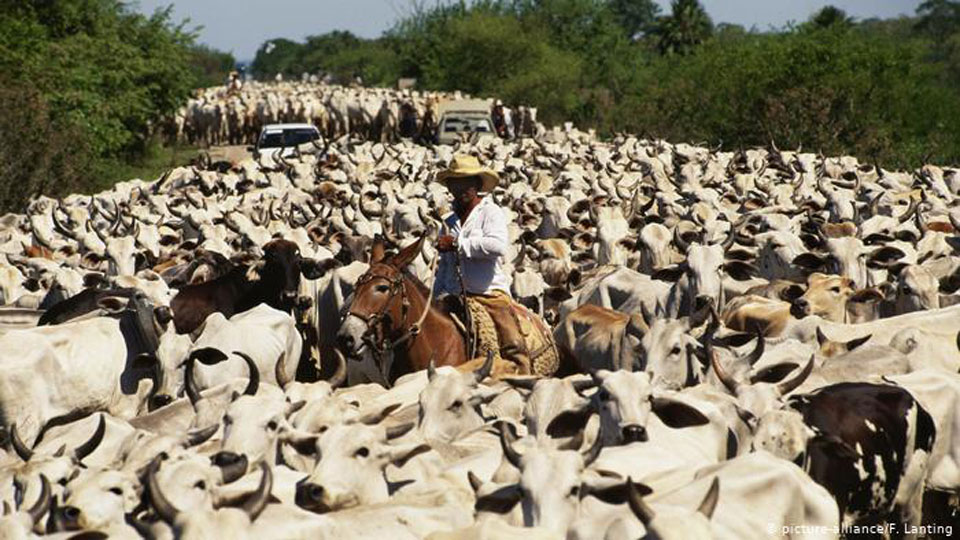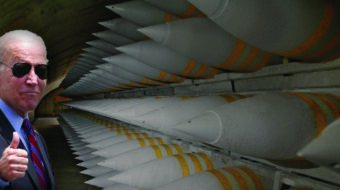
The growing world consumption of meat and the actions of the current government are the main ingredients of a recipe leading to the destruction of the Brazilian rainforest. This is one of the conclusions of Fleischatlas 2021 (“Meat Atlas 2021”), presented last Wednesday, January 6, in Berlin.
“Beef is today one of the main motives for deforestation. This leads to destruction of the means of subsistence for indigenous communities and small landowners. In Amazônia state, cattle graze on 63% of all of the deforested areas. Between 70% and 80% of all beef imported to the European Union (EU) comes from Mercosul countries. And 50% of agricultural products sent from Brazil to the EU are the result of deforestation, especially soymeal, beef, and coffee,” says the Meat Atlas.
“Industrially produced meat is not only responsible for the precariousness of working conditions, but it also removes people from their lands, provokes deforestation, the use of pesticides and the loss of biodiversity—and it is one of the main causes of the climate crisis,” according to Barbara Unmüssig, president of the Heinrich Böll Foundation.
Produced by the Böll Foundation (linked to the German Green Party), by the environmental organization Bund, and the German edition of the French newspaper Le Monde Diplomatique, the report presents solutions with the objective of reducing the consumption of meat, increasing consciousness of people so that they consume higher quality products and also so that they pay more attention to the animals and the products made from them.

Forest destruction
The global demand for meat is increasing due to the growth of the world’s population and economies—a big problem for the climate and the environment. In 1960, there were 3 billion people on Earth and, according to the report, meat consumption was around 70 million tons, which means that the mean annual consumption of meat per person was 23 kilos (10.4 lbs.). By 2018, the world population had more than doubled to 7.6 billion. Production of meat had increased sevenfold to 350 million tons, meaning the mean consumption of meat per person doubled to 46 kilos (20.8 lbs.).
A central problem is the immense need for land to produce meat. According to German government data, 71% of global arable land is now used to grow animal feed, four times more than the land used for the direct production of food (18%) and much more than that for other primary materials, like cotton (7%), or energy-producing crops like corn, used to make biogas or sugarcane for the fabrication of ethanol (4%).
Pressure on globally available arable lands is increasing with the growing world demand for meat. As a consequence, enormous forested areas are being cut down, especially for the cultivation of soybeans used to make animal fodder, which is the case in Brazil. “Today 90% of all the soy grown is to feed animals,” Unmüssig says.

Soy as villain
The report warns that the growth in the world’s meat consumption means that the search for fodder is skyrocketing in the free market and points to soy as the archvillain.
“The biggest producers of soy are Brazil with 133 million tons per year, the U.S with 117 million tons, and Argentina with 53 million tons,” the report delineates. Brazil is also the world’s largest soy exporter with 74 million tons annually, followed by the U.S., according to the Meat Atlas.
Specialists recommend that people change to a diet with less meat and more plant-based food, which requires much less arable land, so the world would be better fed, tropical forests would not be destroyed to raise cattle and the soy to feed it and, at the same time, there would be more land to replant with trees.
Amazon and Cerrado threatened
The report points out that, between 2006 and 2017, 220 thousand square kilometers of forest were destroyed in the Brazilian Amazon and the Cerrado (an area of dense, low vegetation in northern and central Brazil) an area larger than 60% of Germany. About 10% of this land was used to plant soybeans. The report also affirms that the Cerrado is being cut down massively due to the soy moratorium in the Amazon which “prohibits the commercial growing of soybeans in areas of the Amazon that have been deforested since 2008, but that applies only to the Amazon basin.… the production of soybeans was transferred to the Cerrado.”
Widespread forest fires of 2019 and 2020 are proof that there have been setbacks in regard to environmental protection “which were above all the result of fires set to make room for soybean plantations, among others.” The report states that satellite images show that many fires were set in the immediate proximity of meatpacking plants and soybean warehouses. “This is supported by the politics of President Jair Bolsonaro, who is continually relaxing environmental regulations,” the text emphasizes.
According to a study published in 2020 in the prestigious journal Science, 20% of soy exports destined for the EU from Amazon state and the Cerrado come from illegally deforested land. This means that the meat consumed in Europe is directly related to the deforestation of Brazil.
New menu for the world
World-renowned scientists like Johan Rockström, director of the Potsdam Institute for Climatic Impact Studies (PIK), recommend in Report of Healthy Life on a Healthy Planet a change of diet from a median of 16 kilos of meat and 33 kilos of dairy produce annually. The traditional diet of India and many African countries demonstrates that this is possible. In North and South America and in Europe, on the other hand, individuals consume up to seven times more meat in a year. The authors of Meat Atlas 2021 not only show the growth and durability of the international meat industry and its global effects, but they also expose its connections to the world chemical industry.

On one hand, huge conglomerates of meat and food producers (JBS, the Brazilian meat giant is mentioned in the report) are increasingly dominant in the global market comprising the cultivation, transportation, slaughter, and commercialization of animal feed, threatening the existence of smaller cattle dealers and slaughterhouses. On the other hand, the report also reveals that dangerously toxic and sometimes prohibited agrochemicals are exported by giant chemical companies as sprays in other parts of the world. Among the producers and exporters of such products are Bayer Crop Science, Basf and Syngenta in Europe, and Corteva and FMS in the United States.
Thousands of deaths from toxic agriculture
The use of toxic pesticides leads to thousands of deaths, according to Unmüssig. “The German government must do all that it can so that German conglomerates no longer export poisons outlawed in the EU,” emphasizes Olaf Bandt, president of the environmentalist organization Bund, warning that this kind of commerce is likely to grow with the trade agreement between Mercosul and the EU.
Brazil is one of the largest consumers of toxic pesticides and herbicides in the world, employing almost 230,000 tons annually, second only to the U.S., which uses more than 250,000 tons. Together with Argentina (161,000 tons), the three countries are responsible for 70% of the world’s consumption. Today, nine times more pesticides are used in Brazil than 30 years ago. The planting of soybeans alone accounts for approximately 52% of the country’s total sales of pesticides.
Antibiotics
Apart from this, the permanent addition of antibiotics to the preparation of animals for slaughter leads to ever more resistant germs. This threatens the efficacy of antibiotics in human medicine and therefore puts human lives at risk—including those of vegetarians and vegans, the report points out.
Deforestation for the production of animal fodder is also a threat to human health. Wild animals are being forced from their habitats, making contact between them and humans much likelier, which favors interspecies viral transmission and the emergence of new pandemics.
Translated for People’s World by Peter Lownds. The original article in Brasilagro (Jan. 7, 2021) can be viewed here.













Comments